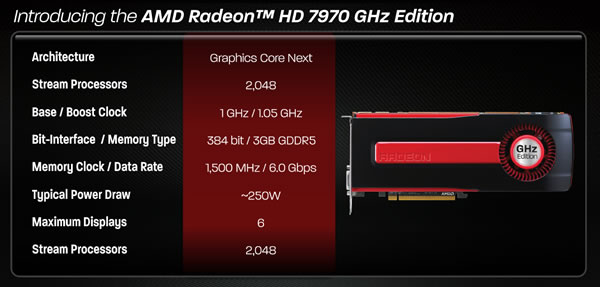Having successfully launched their first 28nm GPU last January, AMD went on to release an entire family of Radeon HD 7000 GPUs over the next few months. The last of the series were the Radeon HD 7870 and 7850 graphics cards, which were closely followed by the launch of Nvidia's next generation flagship part, the GeForce GTX 680.
It didn't take long for the GTX 680 a.k.a. Kepler to knock the Radeon HD 7970 off its perch, becoming the world's fastest single GPU solution. AMD attempted to lessen the blow by cutting pricing of their 7900 and 7800 series lineups. Yet in the end, perhaps the best news for AMD came from the almost complete lack of GTX 680 stock.
In fact even today getting your hands on a GeForce GTX 680 is no easy task and those that have, likely paid more than the retail list $499 price. This didn't stop Nvidia from going on to release the GeForce GTX 670 two months later, at a very attractive $399 price point. At that price the GTX 670 cost less than the Radeon HD 7970 and provided the same level of performance.

Meanwhile, Nvidia's flagship was on average 5% faster than the Radeon HD 7970, with brief bright moments where it could be as much as 30% faster. And this is why the 7970 was cut down from $549 to it's current $449.
Fast forward to the present day and it'd appear that AMD is desperate to claim the bragging rights of offering the single fastest GPU money can buy. As the name suggests the Radeon HD 7970 GHz Edition features a core clock speed of 1GHz, along with overclocked GDDR5 memory running at 1500MHz. AMD plans to charge a small premium for the GHz cards at $499, but is it worth it?
7970 GHz Edition in Detail
For those familiar with the Radeon HD 7970 there isn't much you haven't seen before. Essentially this is the same graphics card with a little factory overclocking and a larger price tag.
Whereas the standard Radeon HD 7970 graphics cards feature a core clock of 925MHz and a memory frequency of 1375MHz, the GHz Edition has been bumped to 1000MHz/1500MHz. This comes up to be a ~8% core overclock and 9% memory overclock, which isn't quite in line with the 11% price increase versus a standard HD 7970 card.

More surprising is the fact that users can already purchase Radeon HD 7970 cards which have been factory overclocked to 1GHz and beyond. The PowerColor PCS+ AX7970 comes clocked at 1.1GHz (core), while the memory is only slightly lower at 1425MHz and it costs just $490.
AMD feels confident that such a modest overclock will be enough to take on the GeForce GTX 680, and today we plan to find out just that.
